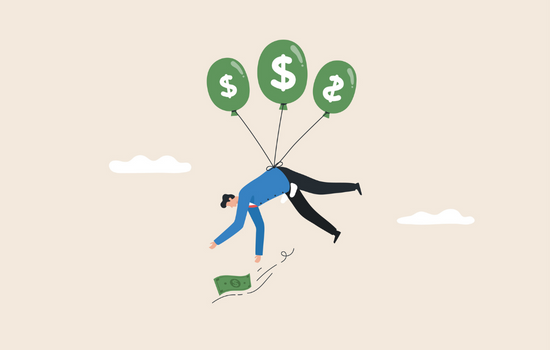
2022 has been the year of inflation. It is constantly in the news and making headlines this year, “Inflation numbers have hit levels that have not been seen since the 1980s”. So, what is inflation and how does it affect us? And what can we do to thrive during inflation?
Merriam-Webster defines inflation as “a continuing rise in the general price level usually attributed to an increase in the volume of money and credit relative to available goods and services.” Think of the 2020 pandemic stimulus money and supply chain issues as a basic example. The stimulus money added a lot of money into the economy, and supply chain issues restricted demand. Inflation grows as the money supply growth outpaces economic growth. Since there is more money in the economy today than in 1970, the purchasing power of that money has changed. For example, a cup of coffee in the 1970s would have cost around $0.25, but now prices are about $1.99 at your local gas station in today’s prices.
As money is abundant, then the value of it is less. Recall 1 Kings 10:21 “All King Solomon’s drinking vessels were of gold, and all the vessels of the House of the Forest of Lebanon were of pure gold. None were of silver; silver was not considered as anything in the days of Solomon.” As the abundance of silver came during Solomon’s reign, it became less valuable in that economy. Inflation affects our overall cost of living significantly as prices rise faster than our personal money supply. The main difference in today’s world from the days of Solomon is that global economies are much more connected, which complicates the ability to control it. Policies of the U.S. Federal Reserve, the European Central Bank, and other countries work to control inflation in their respective countries but also work together on a global scale.
So, how can we thrive during inflation? The first step is to reorganize our monthly budget. As the cost of our daily living increases, we first need to adjust our budget to ensure we are staying within our means. This adjustment may mean dropping something from our monthly expenses to maintain our goals or repositioning where we are spending funds. Second, keep up your investment. Stocks are usually considered the best hedge against inflation since the stock price includes the effects of inflation. There are also special financial instruments designed to protect against inflation; Treasury Inflation-Protected Securities (TIPS), TIPS mutual funds, TIPS-based exchange-traded funds (TIPS ETF), and I bonds (US savings bonds designed to protect the value of your cash from inflation). And then there is gold which many consider a hedge against inflation, although gold has a mixed history when it comes to actually being a good hedge. Real estate is also a popular choice as protection against inflation but is vulnerable to rising interest rates and financial crises.
Inflation is something all of us will face. Plan for it and make adjustments as it comes. Structure your investments and savings in a way that will allow you to weather, not only the tough times and high inflation, but also the good times when everything is going smoothly.

